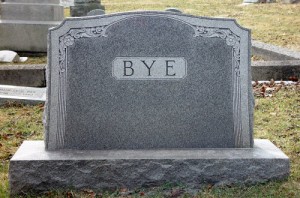To No One’s Sorrow
No one, to my knowledge, enjoys funerals. Yet, they serve an important role in society and in personal mourning. As a preacher, I have attended and officiated at a great number of funerals, including many wonderful people it has been my privilege to know. But the fear that sometimes creeps in is the necessity of sometime needing to deliver the eulogy for a man for whom there is really little to nothing good to say.
Jehoshaphat had several sons, and provided for all of them well in death, but designated his oldest, Jehoram, to reign as king (2 Chr. 21:1-3). But Jehoram acted wickedly from the beginning, murdering his siblings as well as anyone else he considered a threat to his power (2 Chr. 21:4). He claimed Ahab as his father-in-law, and that influence by marriage defined his reign as evil (2 Chr. 21:5-6). Edom recognized this weakness and revolted, and the city of Libnah revolted as well, for spiritual reasons—not wanting to bear the wicked leadership (2 Chr. 21:8-10) that would encourage idolatry (2 Chr. 21:11). Elijah the prophet pronounced judgment against Jehoram, condemning him for forsaking the path of righteousness that his forefathers had chosen in favor of the idolatry of his wife’s family, for the encouragement of that idolatry throughout Judah, and for the murder of his brothers (2 Chr. 21:12-13). For this, the LORD condemned him and his household to affliction (2 Chr. 21:14), fulfilled when neighboring marauders invaded, carrying away his wealth, his wives, and his sons, save for Jehoahas, the youngest—spared for the sake of the LORD”s covenant rather than for the sake of Jehoram (2 Chr. 21:15-17, 7) and then when he came down with a painful disease of the intestines, which killed him after two years of suffering (2 Chr. 21:18-19).
The funeral and eulogy for the king of Judah spoke volumes about his life. The people did not offer a ritual burning in his honor like for previous kings; he did not deserve it (2 Chr. 21:19). They even refused to bury him among the tombs of the kings (2 Chr. 21:20). The LORD had earlier acknowledged that his brothers, who he murdered, were his superiors (2 Chr. 21:13). But how sad that, at the close of any man’s life, it could be said in summary, he, “to no one’s sorrow, departed” (2 Chr. 21:20). Our lives have an impact on the people around us. Our responsibility is to make it the right kind of impact.
